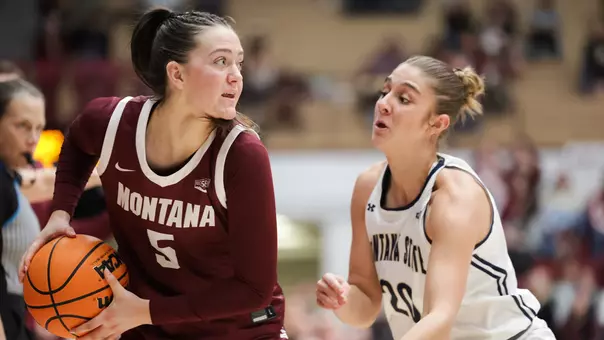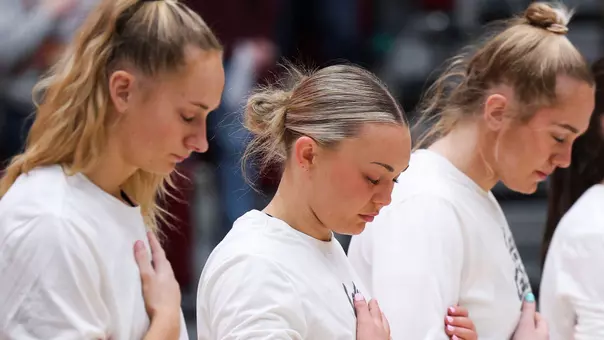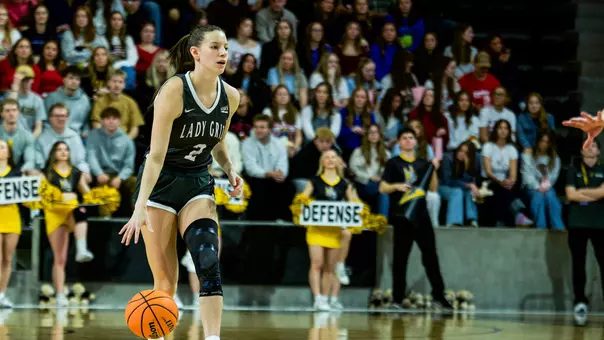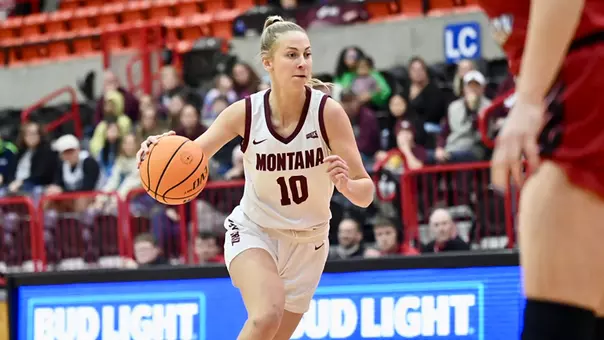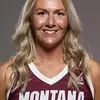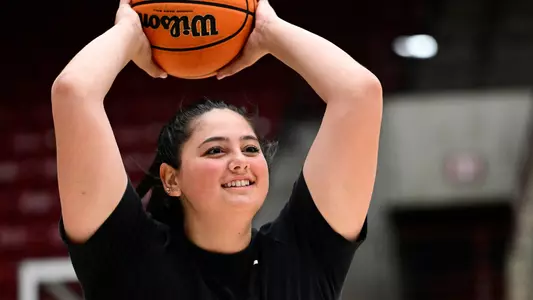
Photo by: Tommy Martino/University of Montana
Lady Griz Orientation :: Izabella Zingaro
10/7/2024 11:24:00 AM | Women's Basketball
There is a picture frame on the mantle behind Lady Griz coach Brian Holsinger's office desk, tiny in size, almost hidden behind a computer screen, easy to miss unless you get up close, near enough to see the two smiles that jump off the image and the words that complete the message and the visual.
It's a small part of the office from a literal perspective – with the piles of paperwork, the books lining one of the walls, the table where the staff meets, the multiple screens for breaking down upcoming opponents, the whiteboard with the next three months scripted out in marker, the office of head coaches everywhere – but it's the biggest, most important thing in the space from another.
It explains everything, the reason he does what he does and does it the way he does it. The inscription reads:
A good coach can change a game
A great coach can change a life
It was a token of deep appreciation, presented to him after last season, Holsinger with his arm around Maggie Espenmiller-McGraw, both of them smiling in a way that can't be faked, genuine, happy, satisfied. That it came after Montana defeated Northern Colorado is secondary. The joy on their faces runs deeper than a result on the scoreboard, much deeper.
Espenmiller-McGraw thought that kind of happiness, at least as a player on a college basketball court, might be gone forever, no longer realistic, a player who began her collegiate career on a high and with so much promise, playing for the same team she grew up cheering for, going out broken, unfulfilled, the dreams she once possessed never to be realized.
She's the one who gifted the framed photo to Holsinger, the coach who gave Espenmiller-McGraw a chance last season to end things on her terms, one final season to find that kind of smile again, to rediscover the love for the game she had developed so many years ago, deepened on so many courts and with so many teammates, the one that had almost been lost. Almost.
More than 2,000 miles away, in another country, a mother of a basketball player who was in nearly the same situation Espenmiller-McGraw had been in, knew what she was witnessing, passion and purpose restored. "Seeing pictures of Maggie on social media, she was a different girl playing at Montana," says Lorianna Zingaro, whose daughter, Izabella, stepped away from basketball 11 months ago.
"It came to a point where she fell out of love with the sport," adds a loving mother about her beloved daughter, who grew to be 6-feet-4 inches in Bolton, Ontario, became the focal point of recruiters across the U.S., played college basketball until she no longer could, put it in her past for her own mental health and wellness, then, last spring, decided to give it one more shot, one more chance to make it right.
But only if she could find the right landing spot.
Just like Espenmiller-McGraw, former college teammate of Zingaro, did the spring prior. "I completely understood where she was coming from," says Espenmiller-McGraw, now an assistant coach at Division II Fort Lewis in Durango, Colorado. "We were on the same team for two and a half years, so we kind of experienced some of the same hardships together. That really bonded us over the years.
"When I came out to Montana, I just had the most awesome experience and happy ending to my career. When I saw she was done, I shared my story of how awesome the coaches, players and community are, and that if she was still interested in playing, I knew Montana would be the perfect fit and she could have the happy ending she deserves. I hope it goes as well for her as it went for me."
Zingaro visited Missoula in the spring, not long after the season was over, the one she put an end to in November, getting out for her own good, avoiding basketball altogether, even seeing it on the television while scrolling through the channels bringing the anxiety back like a weighted blanket, burdening her once again.
But she wanted to give it one more try, one more chance, visiting Montana despite the two rules the family would follow this time around, that it had to be close to home (nope) and that Zingaro would take multiple official visits and not fall head over heels on the first one she took (nope). Like Espenmiller-McGraw before her, Zingaro had found the program, the coach, the place she could become Izzi again.
"From the day she arrived there (in June), I so look forward to getting her phone calls," says her mom, who was on the official visit and didn't make it out of the airport before knowing this was the place. "She used to isolate when she was feeling down and it was very hard to get through to her because she was in such a low place. I don't have to call her anymore. She calls me all the time. She is just so excited.
"For Izabella to say to me that she feels safe, that she feels comfortable, that's huge. We just feel the love. She's moved on to something bigger and definitely better."
----------
Big things grow in Ontario. That's one of the taglines used by the province to tout itself, fitting for Anthony and Lorianna Zingaro, who come from families of modest height but raised two kids, Izabella, then Adamo, who blew past their parents years ago.
It wasn't a slogan that attracted Anthony's and Lorianna's parents, living an hour apart in Italy and not knowing how their paths would one day cross down the road through their kids, to pack up their things and decamp for the opportunities of eastern Canada, Anthony and Lorianna becoming first-generation Canadians while still retaining their full Italian ways.
They met in high school, Anthony the soccer star, the one written about in the local newspapers, the one who had interest from college programs in the U.S., the one who stayed home instead to follow in his father's footsteps as an electrician, one day taking over the family business, Lorianna, the volleyball and basketball player.
He would harbor no regrets at the opportunities he passed on, the chance to play collegiately in the U.S., but the parents also made the decision that they would fully support anything that came the way of Izabella and Adamo, no matter where that might take them, like … synchronized swimming in the Olympics?
"She was my water baby," says Lorianna of her daughter. "Since she was always so strong and so tall, I thought she would do well in (synchronized swimming). Sure enough, they put her with the older kids right away, but it wasn't something she was in love with."
Basketball was another story, but the connection to the sport, at least at the start, had nothing to do with Zingaro's height or stature. Anthony and Lorianna weren't picturing a spot on the Ontario U15 team that would win their daughter a national gold medal at the age of 14 or take her to Chile or Hungary for FIBA events. They simply wanted to see their oldest get out of her comfort zone.
"When we were originally asked to have her try out for basketball, our choice was more for the social aspect. She used to be a very shy girl," says Lorianna. "We wanted her to grow her social circle and learn how to be independent. In organized sports, there is independence, responsibility, listening to someone who isn't mom or dad or a teacher. That's initially why she got into it."
And so began a meteoric rise, one that matched her own growth, hitting six-feet by the age of 13, starting with Uncle Vic and the Caledon Cougars, ending with coach Gordon Everett on Caledon Academy's team in the Ontario Scholastic Basketball League, the same league that produced Aaliyah Edwards, one year older than Zingaro and who would go on to play at Connecticut and now for the Washington Mystics.
"I was always coaching ahead of her but knew she was coming up," says Everett of the player who was in leg braces way back, her knees objecting to all the growing, this player who is left-handed but might look like a right-hander if you didn't know any better. "She could play both very, very well," says her mom. "That confused a lot of people and had a lot of people paying attention to her.
"She did very well in the sport right from the beginning," getting interest from the age of 11, getting invited at the age of 13 to try out for the Ontario U15 team, making it at 14 and winning a national championship, playing for age-group national teams that traveled overseas. "She didn't have much of a social life. The basketball court was always her safe place."
"Once she started getting chances with Team Ontario and Team Canada, I think she knew the sky was the limit and fully invested in it," adds Everett, who coached Zingaro as an 11th grader, when she and Edwards, then a senior at Crestwood Prep in Toronto, went back and forth for their league's scoring and rebounding titles.
"At that point it was pretty clear. Staying in Canada might be nice for the Canadian schools, but the attention she was receiving south of the border made it feel pretty inevitable. She offered things other players her size didn't have, like going downhill from the high post or from the perimeter. It's hard to stop her from going downhill to the basket. She attracted a lot of interest."
Playing collegiately in the U.S. was never Zingaro's goal or even a dream. She was already living it by just playing the sport she loved.
"I never really thought of it growing up. I never watched college sports. Canada college sports are not as popular as it is in the U.S.," she says. That made it a really big deal when recruiting materials, so unexpected, would arrive in the family mailbox, the different pamphlets and brochures getting spread out on the table, the entire family in awe of what was taking place.
"We were so excited. We were not stressed at all, just super proud," says Lorianna. "When we'd come home from work, she'd have all the fliers on the table, or she'd take a picture and send it to us. It was an exciting time. Okay, you can go somewhere with this, but we were quite naïve.
"Maybe you can go to the U.S., get a scholarship and a great education and have a great experience and we can travel to come and see you." And it would be idyllic, just about perfect.
They went on a visit to a Big Ten school, just Anthony and Izabella, then went on another to a school in the Big 12, this time the entire family going, even Adamo, the specialness of the family spending time together on a road trip making the school seem perfect more by association than anything else.
"Because we took it as a family trip, it was very memorable," says Lorianna. "I fall in love very easily."
Zingaro committed near Christmas of her junior year, COVID arriving a few months later, shuttering gyms and basketball in Ontario, her senior season at risk of being wiped out completely, her new team asking if she could graduate early and begin her collegiate career in January 2021.
Lorianna says, "That kid sat at that kitchen table from the moment she woke up until the moment she went to bed" to get the schoolwork completed in order to graduate early to then be able to move to a new country and join a team and new teammates in the middle of their season and be placed in a one-person apartment, groceries being delivered to her door while trying college coursework on for size.
Oh, and she was only 17 at the time and someone who functioned best while surrounded by family, the Italian way. "Looking back, we probably would have done it differently," says her mom. "It was a stressful time for all of us. She had to deal with a lot on her own that she didn't have to do before. That was hard and a difficult transition. But she did it. We were very proud of her."
She played three games at the back end of that season, one that would end at the modified NCAA tournament in San Antonio, the one when Espenmiller-McGraw, who had set herself up for a storybook career as a freshman the season before, was limited to nine games, the start of a downward spiral.
The next season, finally what she had signed up for, a full year to acclimate, a 28-win team with Zingaro getting minutes here and there off the bench, five wins over ranked opponents, two home wins in the NCAA tournament that sent her team to the Sweet 16. How could that be anything but perfect?
"At the end of that first full season, something was not adding up for us," says Lorianna. "Speaking with other Canadian families, we knew it would be difficult and there were going to be ups and downs, but seeing what other Canadians were experiencing and the relationships they had with their coaches, I'm thinking, Izabella is not having any of that. Something is not right here."
But leaving never crossed Zingaro's mind. "I'm a very loyal person. I didn't want to be viewed as a quitter. Even when times were really tough, I'm going to keep going. It's going to get better."
The 2022-23 season was better, right? Twenty-two wins, five against ranked opponents. Zingaro playing in 24 of 32 games. At least that's what the public saw, a girl getting the chance to be on a winning team that plays in front of one of the nation's top fan bases. But that's only seeing what's taking place on one side of the curtain. The other side is hidden from view for a reason.
"It's hard to tell what's going on to someone from the outside," says Zingaro, who a year ago reached the end. She couldn't do it anymore. "It got to the point where I was at a long-time low and my mental health was not so great. The only way I was going to get better was to separate myself from the environment. I thought I'd push through another season, but that's not what I needed.
"When you're playing a sport that you've loved your whole life but you're not having fun anymore, you know something's wrong."
The phone calls home were heartbreaking, parents more than 800 miles away, able to help only as much as they could electronically. "Being that far away killed us," says Lorianna. Daughter oftentimes would end up in tears, followed by parents. "It was so difficult for us that we couldn't be there for her. Sometimes you need that physical hug."
They knew well about their daughter's loyalty, how things had to be at their most dire for her to walk away from a team. When she told them she needed to, they knew how serious it was and that she was making the right, the best and the only decision she could. "For her to make a decision like that, we knew we needed to respect that. We supported her 100 percent.
"What I would have loved to do was go help her pack up and get her on a plane and protect her, but at that point, she was an adult and had to do it on her own. We supported her from where we were as much as we could."
She stayed, earned her degree last spring in business management, took the first steps toward making herself whole again, a work still in progress, heard from Espenmiller-McGraw that there are places out there – Montana, anyone? – where a girl can go and make it right again, bring back the love, the trust, the joy, that it doesn't have to end like this, chased from the game before she's ready.
"As time went on, I kind of missed it. This is a sport that I love and wanted to keep doing and I thought I was ready," Zingaro said. "I didn't want to end basketball on a bad point. One day I want to be able to look back and remember that I had a great time, not how I felt in that moment."
It would be a family conversation but Zingaro's decision, everyone on board with whatever she chose. The pros were brought up, the cons also. Had her decision been announced from the Sistine Chapel's chimney, the smoke would have been colored orange. She was coming back.
She had her exemplar in Espenmiller-McGraw, embracing her one year as a Lady Griz last season while Zingaro was away from the game, wondering if she'd ever get to play again or even wanted to. "When she was here, I'd always check on her," says Zingaro. "She was so happy and so grateful that she found a place where she could find the fun in basketball again. That's something I was looking to do."
But what about the rules? No more than two hours from home, which left plenty of desirable programs in the northeast and totally excluded Montana, more than twice as far from home as her previous stop, but what about at least checking out the Lady Griz, because hadn't Espenmiller-McGraw been in nearly the exact same situation as Zingaro had been in?
"The whole connection started because of Maggie," says Holsinger. "She was a gigantic part of it. We took good care of Maggie and she loved it here. Their experiences were somewhat similar. Everybody has to find their right fit and Maggie felt this would be a better fit for Izzi."
Let's welcome Anthony to the story, who was done with a long-distance father-daughter relationship, who was so traumatized by Izabella's first college basketball experience that he needed her to be a short drive away for her next stop because he'd been scarred and just assumed the same thing was going to happen again.
"When the idea was to come visit Montana, I kind of had to drag my husband," says Lorianna. That would mean Holsinger and his staff would have to do some heavy, heavy lifting, but that also meant the Zingaros were the exact type of people he likes to bring into the Lady Griz family. "They are good people who love their daughter deeply and want the best for her," says Holsinger.
There was trouble from the opening phone conversation, before any discussion of visiting campus had come up. The best kind of trouble. "As soon as I started talking to Brian and (associate head coach Nate Harris), I thought, oh, this is going to be so hard," says Zingaro. She was already falling for Montana in a big way, just as Espenmiller-McGraw had.
"I would talk to them as if they were family and I had just met them. That was something I wasn't used to. That got Montana stuck in my mind and kind of changed my mindset a little bit."
And then they landed at the airport and there was even more trouble. Again, the best kind.
"To see that moment when she got off the plane, that first interaction, from the first hello with the coaches, I knew right then, at this moment, that this was going to be the school. They made such an impression on us," says Lorianna. "She was so happy. To see her engage and laugh and have that little giddy attitude, I hadn't seen that in years."
What's a dad, watching out for his only daughter, to do but dig in his heels? After all, hadn't they all agreed NO MORE THAN TWO HOURS FROM HOME? Is he the only one who remembers what happened last time, how it went south so quickly, how they couldn't be there for their daughter, and what if the same thing happened again? And they hadn't even gotten out of the airport. Trouble, indeed.
It was a weekend of dueling emotions, tears because basketball and their daughter were coming together once again and leading to smiles, laughter and joy. And tears because they saw she was falling for it all and this was Montana and not even close to home and we don't want to believe things will repeat but what if they do. This will be even worse than before. They'd been conditioned to be fatalistic.
Anthony and Lorianna were at the hotel during the visit, Izabella on the treadmill downstairs working up a sweat, thinking things through. "We had a conversation. He was more worried than I was," Lorianna says. "Every time we thought she wasn't going to make it through, that kid just pulled up her socks and did it and proved us wrong. I had to remind him of that."
When Zingaro was first being recruited, not only young but naïve to most everything about high-level college women's basketball in the U.S., "they showed us bells and whistles and we were sold on the bells and whistles," says Lorianna. "We learned the bells and whistles are not necessarily important."
While Holsinger can sell the facilities at Montana, the history of the Lady Griz, a top-level fan base, a program on the rise, he emphasizes relationships, between coaches and players, between players and players. It's what he's using as the foundation for this new version of the Lady Griz and for more and more players coming up in the current era, it speaks to them and is just what they've been looking for.
"I had a different way of thinking when visiting schools this time around," says Zingaro. "The main thing I was looking for was the people. I didn't care what level of Division I, didn't care about the facilities or the gear. It was more toward the people. I wanted to be around people who were truly a family.
"I wanted to feel it, to have coaches and teammates I'm able to connect with, be able to talk with if I need something outside of basketball or if I'm having a bad day. That's something I never really had before. I knew Brian would help build me back up again and be the person and the player I used to be and want to be again. I knew visiting here that I should have come here earlier."
Adds Lorianna, "For her, it's about the people. She needed to know the coaches would be open to communication. She needed to know she could walk through their door and not have any fear or have any anxiety going to practice or just waking up in the morning."
And then they were gone, back home to Canada, their first visit complete, their second rule now in effect, that they would visit more than just one school.
She was in demand after all, as any skilled 6-foot-4 post player with two years of eligibility would be, schools large and small taking their shot. Most of them lasted a single phone call. "There were some I crossed off after the first conversation. I'm not feeling it," Zingaro says. "I knew how I wanted to be able to talk to my head coach."
And Montana could offer her something else: an immediate and impactful role, with Carmen Gfeller having graduated and Imogen Greenslade still coming back from last season's knee injury. And she couldn't get the stories of Espenmiller-McGraw and Gina Marxen, players who wanted to find their love of the game again and discovered it at Montana, out of her mind.
"There are a lot of coaches out there who don't understand that you can be happy and still work hard and win," says Zingaro, not needing to mention that Montana won 23 games last season, the most in what felt like a long, long, long time.
She never did make another visit, Montana staying front of mind from airport to commitment, Anthony and Lorianna sacrificing distance for happiness, hers and by extension theirs. They know that the best is yet to come. And that Holsinger has time but he'd better make another spot on his mantle, right next to the framed photo Espenmiller-McGraw presented to him last spring, after he changed her life.
"If you're going to hold back Izabella, she will play as if she's being held back," says Lorianna. "If you're going to allow Izabella to stretch her wings and show her that she is valued and that she is part of the team, then she is going to play like that." We can only wait and wonder what's to come, another player unleashed and unburdened, ready to be at her best once again, smiling from start to finish.
It's a small part of the office from a literal perspective – with the piles of paperwork, the books lining one of the walls, the table where the staff meets, the multiple screens for breaking down upcoming opponents, the whiteboard with the next three months scripted out in marker, the office of head coaches everywhere – but it's the biggest, most important thing in the space from another.
It explains everything, the reason he does what he does and does it the way he does it. The inscription reads:
A good coach can change a game
A great coach can change a life
It was a token of deep appreciation, presented to him after last season, Holsinger with his arm around Maggie Espenmiller-McGraw, both of them smiling in a way that can't be faked, genuine, happy, satisfied. That it came after Montana defeated Northern Colorado is secondary. The joy on their faces runs deeper than a result on the scoreboard, much deeper.
Espenmiller-McGraw thought that kind of happiness, at least as a player on a college basketball court, might be gone forever, no longer realistic, a player who began her collegiate career on a high and with so much promise, playing for the same team she grew up cheering for, going out broken, unfulfilled, the dreams she once possessed never to be realized.
She's the one who gifted the framed photo to Holsinger, the coach who gave Espenmiller-McGraw a chance last season to end things on her terms, one final season to find that kind of smile again, to rediscover the love for the game she had developed so many years ago, deepened on so many courts and with so many teammates, the one that had almost been lost. Almost.
More than 2,000 miles away, in another country, a mother of a basketball player who was in nearly the same situation Espenmiller-McGraw had been in, knew what she was witnessing, passion and purpose restored. "Seeing pictures of Maggie on social media, she was a different girl playing at Montana," says Lorianna Zingaro, whose daughter, Izabella, stepped away from basketball 11 months ago.
"It came to a point where she fell out of love with the sport," adds a loving mother about her beloved daughter, who grew to be 6-feet-4 inches in Bolton, Ontario, became the focal point of recruiters across the U.S., played college basketball until she no longer could, put it in her past for her own mental health and wellness, then, last spring, decided to give it one more shot, one more chance to make it right.
But only if she could find the right landing spot.
Just like Espenmiller-McGraw, former college teammate of Zingaro, did the spring prior. "I completely understood where she was coming from," says Espenmiller-McGraw, now an assistant coach at Division II Fort Lewis in Durango, Colorado. "We were on the same team for two and a half years, so we kind of experienced some of the same hardships together. That really bonded us over the years.
"When I came out to Montana, I just had the most awesome experience and happy ending to my career. When I saw she was done, I shared my story of how awesome the coaches, players and community are, and that if she was still interested in playing, I knew Montana would be the perfect fit and she could have the happy ending she deserves. I hope it goes as well for her as it went for me."
Zingaro visited Missoula in the spring, not long after the season was over, the one she put an end to in November, getting out for her own good, avoiding basketball altogether, even seeing it on the television while scrolling through the channels bringing the anxiety back like a weighted blanket, burdening her once again.
But she wanted to give it one more try, one more chance, visiting Montana despite the two rules the family would follow this time around, that it had to be close to home (nope) and that Zingaro would take multiple official visits and not fall head over heels on the first one she took (nope). Like Espenmiller-McGraw before her, Zingaro had found the program, the coach, the place she could become Izzi again.
"From the day she arrived there (in June), I so look forward to getting her phone calls," says her mom, who was on the official visit and didn't make it out of the airport before knowing this was the place. "She used to isolate when she was feeling down and it was very hard to get through to her because she was in such a low place. I don't have to call her anymore. She calls me all the time. She is just so excited.
"For Izabella to say to me that she feels safe, that she feels comfortable, that's huge. We just feel the love. She's moved on to something bigger and definitely better."
----------
Big things grow in Ontario. That's one of the taglines used by the province to tout itself, fitting for Anthony and Lorianna Zingaro, who come from families of modest height but raised two kids, Izabella, then Adamo, who blew past their parents years ago.
It wasn't a slogan that attracted Anthony's and Lorianna's parents, living an hour apart in Italy and not knowing how their paths would one day cross down the road through their kids, to pack up their things and decamp for the opportunities of eastern Canada, Anthony and Lorianna becoming first-generation Canadians while still retaining their full Italian ways.
They met in high school, Anthony the soccer star, the one written about in the local newspapers, the one who had interest from college programs in the U.S., the one who stayed home instead to follow in his father's footsteps as an electrician, one day taking over the family business, Lorianna, the volleyball and basketball player.
He would harbor no regrets at the opportunities he passed on, the chance to play collegiately in the U.S., but the parents also made the decision that they would fully support anything that came the way of Izabella and Adamo, no matter where that might take them, like … synchronized swimming in the Olympics?
"She was my water baby," says Lorianna of her daughter. "Since she was always so strong and so tall, I thought she would do well in (synchronized swimming). Sure enough, they put her with the older kids right away, but it wasn't something she was in love with."
Basketball was another story, but the connection to the sport, at least at the start, had nothing to do with Zingaro's height or stature. Anthony and Lorianna weren't picturing a spot on the Ontario U15 team that would win their daughter a national gold medal at the age of 14 or take her to Chile or Hungary for FIBA events. They simply wanted to see their oldest get out of her comfort zone.
"When we were originally asked to have her try out for basketball, our choice was more for the social aspect. She used to be a very shy girl," says Lorianna. "We wanted her to grow her social circle and learn how to be independent. In organized sports, there is independence, responsibility, listening to someone who isn't mom or dad or a teacher. That's initially why she got into it."
And so began a meteoric rise, one that matched her own growth, hitting six-feet by the age of 13, starting with Uncle Vic and the Caledon Cougars, ending with coach Gordon Everett on Caledon Academy's team in the Ontario Scholastic Basketball League, the same league that produced Aaliyah Edwards, one year older than Zingaro and who would go on to play at Connecticut and now for the Washington Mystics.
"I was always coaching ahead of her but knew she was coming up," says Everett of the player who was in leg braces way back, her knees objecting to all the growing, this player who is left-handed but might look like a right-hander if you didn't know any better. "She could play both very, very well," says her mom. "That confused a lot of people and had a lot of people paying attention to her.
"She did very well in the sport right from the beginning," getting interest from the age of 11, getting invited at the age of 13 to try out for the Ontario U15 team, making it at 14 and winning a national championship, playing for age-group national teams that traveled overseas. "She didn't have much of a social life. The basketball court was always her safe place."
"Once she started getting chances with Team Ontario and Team Canada, I think she knew the sky was the limit and fully invested in it," adds Everett, who coached Zingaro as an 11th grader, when she and Edwards, then a senior at Crestwood Prep in Toronto, went back and forth for their league's scoring and rebounding titles.
"At that point it was pretty clear. Staying in Canada might be nice for the Canadian schools, but the attention she was receiving south of the border made it feel pretty inevitable. She offered things other players her size didn't have, like going downhill from the high post or from the perimeter. It's hard to stop her from going downhill to the basket. She attracted a lot of interest."
Playing collegiately in the U.S. was never Zingaro's goal or even a dream. She was already living it by just playing the sport she loved.
"I never really thought of it growing up. I never watched college sports. Canada college sports are not as popular as it is in the U.S.," she says. That made it a really big deal when recruiting materials, so unexpected, would arrive in the family mailbox, the different pamphlets and brochures getting spread out on the table, the entire family in awe of what was taking place.
"We were so excited. We were not stressed at all, just super proud," says Lorianna. "When we'd come home from work, she'd have all the fliers on the table, or she'd take a picture and send it to us. It was an exciting time. Okay, you can go somewhere with this, but we were quite naïve.
"Maybe you can go to the U.S., get a scholarship and a great education and have a great experience and we can travel to come and see you." And it would be idyllic, just about perfect.
They went on a visit to a Big Ten school, just Anthony and Izabella, then went on another to a school in the Big 12, this time the entire family going, even Adamo, the specialness of the family spending time together on a road trip making the school seem perfect more by association than anything else.
"Because we took it as a family trip, it was very memorable," says Lorianna. "I fall in love very easily."
Zingaro committed near Christmas of her junior year, COVID arriving a few months later, shuttering gyms and basketball in Ontario, her senior season at risk of being wiped out completely, her new team asking if she could graduate early and begin her collegiate career in January 2021.
Lorianna says, "That kid sat at that kitchen table from the moment she woke up until the moment she went to bed" to get the schoolwork completed in order to graduate early to then be able to move to a new country and join a team and new teammates in the middle of their season and be placed in a one-person apartment, groceries being delivered to her door while trying college coursework on for size.
Oh, and she was only 17 at the time and someone who functioned best while surrounded by family, the Italian way. "Looking back, we probably would have done it differently," says her mom. "It was a stressful time for all of us. She had to deal with a lot on her own that she didn't have to do before. That was hard and a difficult transition. But she did it. We were very proud of her."
She played three games at the back end of that season, one that would end at the modified NCAA tournament in San Antonio, the one when Espenmiller-McGraw, who had set herself up for a storybook career as a freshman the season before, was limited to nine games, the start of a downward spiral.
The next season, finally what she had signed up for, a full year to acclimate, a 28-win team with Zingaro getting minutes here and there off the bench, five wins over ranked opponents, two home wins in the NCAA tournament that sent her team to the Sweet 16. How could that be anything but perfect?
"At the end of that first full season, something was not adding up for us," says Lorianna. "Speaking with other Canadian families, we knew it would be difficult and there were going to be ups and downs, but seeing what other Canadians were experiencing and the relationships they had with their coaches, I'm thinking, Izabella is not having any of that. Something is not right here."
But leaving never crossed Zingaro's mind. "I'm a very loyal person. I didn't want to be viewed as a quitter. Even when times were really tough, I'm going to keep going. It's going to get better."
The 2022-23 season was better, right? Twenty-two wins, five against ranked opponents. Zingaro playing in 24 of 32 games. At least that's what the public saw, a girl getting the chance to be on a winning team that plays in front of one of the nation's top fan bases. But that's only seeing what's taking place on one side of the curtain. The other side is hidden from view for a reason.
"It's hard to tell what's going on to someone from the outside," says Zingaro, who a year ago reached the end. She couldn't do it anymore. "It got to the point where I was at a long-time low and my mental health was not so great. The only way I was going to get better was to separate myself from the environment. I thought I'd push through another season, but that's not what I needed.
"When you're playing a sport that you've loved your whole life but you're not having fun anymore, you know something's wrong."
The phone calls home were heartbreaking, parents more than 800 miles away, able to help only as much as they could electronically. "Being that far away killed us," says Lorianna. Daughter oftentimes would end up in tears, followed by parents. "It was so difficult for us that we couldn't be there for her. Sometimes you need that physical hug."
They knew well about their daughter's loyalty, how things had to be at their most dire for her to walk away from a team. When she told them she needed to, they knew how serious it was and that she was making the right, the best and the only decision she could. "For her to make a decision like that, we knew we needed to respect that. We supported her 100 percent.
"What I would have loved to do was go help her pack up and get her on a plane and protect her, but at that point, she was an adult and had to do it on her own. We supported her from where we were as much as we could."
She stayed, earned her degree last spring in business management, took the first steps toward making herself whole again, a work still in progress, heard from Espenmiller-McGraw that there are places out there – Montana, anyone? – where a girl can go and make it right again, bring back the love, the trust, the joy, that it doesn't have to end like this, chased from the game before she's ready.
"As time went on, I kind of missed it. This is a sport that I love and wanted to keep doing and I thought I was ready," Zingaro said. "I didn't want to end basketball on a bad point. One day I want to be able to look back and remember that I had a great time, not how I felt in that moment."
It would be a family conversation but Zingaro's decision, everyone on board with whatever she chose. The pros were brought up, the cons also. Had her decision been announced from the Sistine Chapel's chimney, the smoke would have been colored orange. She was coming back.
She had her exemplar in Espenmiller-McGraw, embracing her one year as a Lady Griz last season while Zingaro was away from the game, wondering if she'd ever get to play again or even wanted to. "When she was here, I'd always check on her," says Zingaro. "She was so happy and so grateful that she found a place where she could find the fun in basketball again. That's something I was looking to do."
But what about the rules? No more than two hours from home, which left plenty of desirable programs in the northeast and totally excluded Montana, more than twice as far from home as her previous stop, but what about at least checking out the Lady Griz, because hadn't Espenmiller-McGraw been in nearly the exact same situation as Zingaro had been in?
"The whole connection started because of Maggie," says Holsinger. "She was a gigantic part of it. We took good care of Maggie and she loved it here. Their experiences were somewhat similar. Everybody has to find their right fit and Maggie felt this would be a better fit for Izzi."
Let's welcome Anthony to the story, who was done with a long-distance father-daughter relationship, who was so traumatized by Izabella's first college basketball experience that he needed her to be a short drive away for her next stop because he'd been scarred and just assumed the same thing was going to happen again.
"When the idea was to come visit Montana, I kind of had to drag my husband," says Lorianna. That would mean Holsinger and his staff would have to do some heavy, heavy lifting, but that also meant the Zingaros were the exact type of people he likes to bring into the Lady Griz family. "They are good people who love their daughter deeply and want the best for her," says Holsinger.
There was trouble from the opening phone conversation, before any discussion of visiting campus had come up. The best kind of trouble. "As soon as I started talking to Brian and (associate head coach Nate Harris), I thought, oh, this is going to be so hard," says Zingaro. She was already falling for Montana in a big way, just as Espenmiller-McGraw had.
"I would talk to them as if they were family and I had just met them. That was something I wasn't used to. That got Montana stuck in my mind and kind of changed my mindset a little bit."
And then they landed at the airport and there was even more trouble. Again, the best kind.
"To see that moment when she got off the plane, that first interaction, from the first hello with the coaches, I knew right then, at this moment, that this was going to be the school. They made such an impression on us," says Lorianna. "She was so happy. To see her engage and laugh and have that little giddy attitude, I hadn't seen that in years."
What's a dad, watching out for his only daughter, to do but dig in his heels? After all, hadn't they all agreed NO MORE THAN TWO HOURS FROM HOME? Is he the only one who remembers what happened last time, how it went south so quickly, how they couldn't be there for their daughter, and what if the same thing happened again? And they hadn't even gotten out of the airport. Trouble, indeed.
It was a weekend of dueling emotions, tears because basketball and their daughter were coming together once again and leading to smiles, laughter and joy. And tears because they saw she was falling for it all and this was Montana and not even close to home and we don't want to believe things will repeat but what if they do. This will be even worse than before. They'd been conditioned to be fatalistic.
Anthony and Lorianna were at the hotel during the visit, Izabella on the treadmill downstairs working up a sweat, thinking things through. "We had a conversation. He was more worried than I was," Lorianna says. "Every time we thought she wasn't going to make it through, that kid just pulled up her socks and did it and proved us wrong. I had to remind him of that."
When Zingaro was first being recruited, not only young but naïve to most everything about high-level college women's basketball in the U.S., "they showed us bells and whistles and we were sold on the bells and whistles," says Lorianna. "We learned the bells and whistles are not necessarily important."
While Holsinger can sell the facilities at Montana, the history of the Lady Griz, a top-level fan base, a program on the rise, he emphasizes relationships, between coaches and players, between players and players. It's what he's using as the foundation for this new version of the Lady Griz and for more and more players coming up in the current era, it speaks to them and is just what they've been looking for.
"I had a different way of thinking when visiting schools this time around," says Zingaro. "The main thing I was looking for was the people. I didn't care what level of Division I, didn't care about the facilities or the gear. It was more toward the people. I wanted to be around people who were truly a family.
"I wanted to feel it, to have coaches and teammates I'm able to connect with, be able to talk with if I need something outside of basketball or if I'm having a bad day. That's something I never really had before. I knew Brian would help build me back up again and be the person and the player I used to be and want to be again. I knew visiting here that I should have come here earlier."
Adds Lorianna, "For her, it's about the people. She needed to know the coaches would be open to communication. She needed to know she could walk through their door and not have any fear or have any anxiety going to practice or just waking up in the morning."
And then they were gone, back home to Canada, their first visit complete, their second rule now in effect, that they would visit more than just one school.
She was in demand after all, as any skilled 6-foot-4 post player with two years of eligibility would be, schools large and small taking their shot. Most of them lasted a single phone call. "There were some I crossed off after the first conversation. I'm not feeling it," Zingaro says. "I knew how I wanted to be able to talk to my head coach."
And Montana could offer her something else: an immediate and impactful role, with Carmen Gfeller having graduated and Imogen Greenslade still coming back from last season's knee injury. And she couldn't get the stories of Espenmiller-McGraw and Gina Marxen, players who wanted to find their love of the game again and discovered it at Montana, out of her mind.
"There are a lot of coaches out there who don't understand that you can be happy and still work hard and win," says Zingaro, not needing to mention that Montana won 23 games last season, the most in what felt like a long, long, long time.
She never did make another visit, Montana staying front of mind from airport to commitment, Anthony and Lorianna sacrificing distance for happiness, hers and by extension theirs. They know that the best is yet to come. And that Holsinger has time but he'd better make another spot on his mantle, right next to the framed photo Espenmiller-McGraw presented to him last spring, after he changed her life.
"If you're going to hold back Izabella, she will play as if she's being held back," says Lorianna. "If you're going to allow Izabella to stretch her wings and show her that she is valued and that she is part of the team, then she is going to play like that." We can only wait and wonder what's to come, another player unleashed and unburdened, ready to be at her best once again, smiling from start to finish.
Players Mentioned
Griz Basketball Press Confrerence - Montana State (2/11/26)
Wednesday, February 11
Griz Basketball vs. Idaho Highlights - 2/7/25
Monday, February 09
Griz Football Coach Bobby Kennedy Introductory Press Conference
Friday, February 06
Bobby Kennedy Introductory Press Conference
Thursday, February 05

